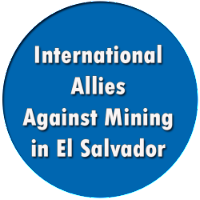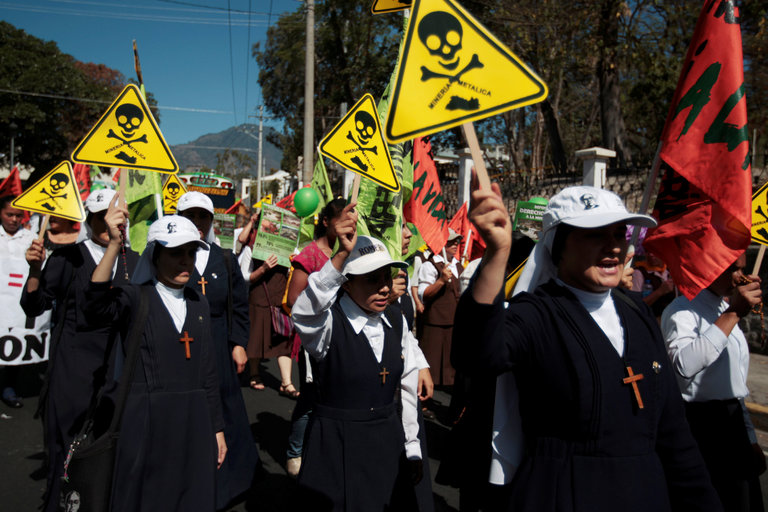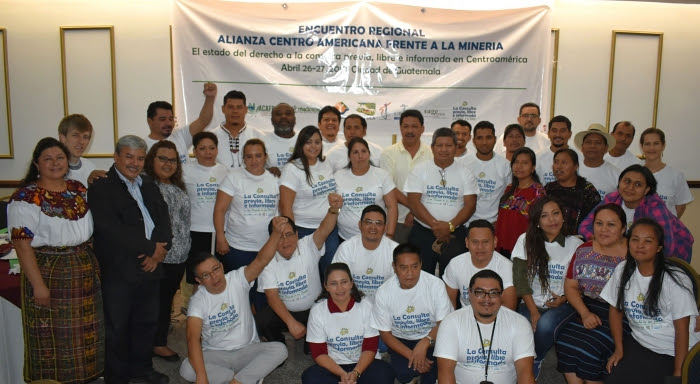Esty DInur - The Progressive
 In March 2017, El Salvador, a country with deposits of gold and silver, became the first and only country in the world to ban all metallic mining.
In March 2017, El Salvador, a country with deposits of gold and silver, became the first and only country in the world to ban all metallic mining.
The process took twelve years, according to Pedro Cabezas, who runs the mining and human rights program of CRIPDES, the largest rural organization in the country and a leader in the Salvadoran social movement. It is a story of popular organizing, which American and other activists might want to pay attention to and learn from. It is also a tale of collaborations across causes, sectors, geographic areas, and national borders.
El Salvador has a history of small artisanal mines, including a small mine in San SebastiûÀn which was started some 100 years ago by local people. However, mining wasnãt an important part of the economy until the 1970s, when Commerce Group Corp. of Waukesha, Wisconsin, started operating the mine, turning the San SebastiûÀn River waters orange from the chemicals, including cyanide, arsenic, and mercury, that seeped into it. Local people canãt use the water for drinking, washing, or watering their crops, and there are numerous cases of cancer and respiratory diseases in the area. Most mining stopped during the civil war that raged from 1980 to 1992.
Salvadorans Reinforce Commitment to Sustain Historic Mining Ban on its First Anniversary
- Details
- Category: Media Releases
- Published: Sunday, 06 May 2018 18:39

April 4th, 2018
A year since El Salvador's legislature unanimously approved a law prohibiting all metal mining activities in the country, Salvadoran organizations including the National Roundtable Against Metallic Mining are reaffirming their commitment to ensure the small Central American country continues to be an example to the world in the defence of precious water supplies. They are also warning of the risk that the law could be repealed.
Looming threats to the mining prohibition in El Salvador
- Details
- Category: Mining prohibition El Salvador
- Published: Thursday, 08 February 2018 01:07
P. Cabezas
 In March 2017, El Salvador became the first country in the world to ban metallic mining. But the huge victory of the antimining movement and the international recognition it has garnered may be overshadowed by a current electoral campaign that threatens to reverse the legislative balance of power in favor of the prohibition in the short term, and the executive governmentôÇs in the mid-term.
In March 2017, El Salvador became the first country in the world to ban metallic mining. But the huge victory of the antimining movement and the international recognition it has garnered may be overshadowed by a current electoral campaign that threatens to reverse the legislative balance of power in favor of the prohibition in the short term, and the executive governmentôÇs in the mid-term.
At a recent event organized by the National Roundtable Against Mining to commemorate those who lost their lives in CabaûÝas during the struggle, leaders from communities that were most affected by mining projects said that some political battles are still pending to ensure the long-term sustainability of the mining prohibition. ãFirst we need to ensure that the Attorney Generalãs office investigate the intellectual authors of the murders of environmental defenders who were assassinated in 2009, second we need to ensure that Minerales Torogoz, and the El Dorado Foundation leave CabaûÝas, and third we need our government institutions to generate sustainable economic activities in the region so those toxic companies never come backã Said Domingo Miranda, president of the La MaraûÝa Environmental Association.


 A few weeks after the first anniversary of the mining ban in El Salvador environmental activists in the country are wondering how long before the ban is overturned.
A few weeks after the first anniversary of the mining ban in El Salvador environmental activists in the country are wondering how long before the ban is overturned.  A year has passed since the Law against Metallic Mining was approved. The prohibition is a victory resulting from almost 13 years of struggle led by organizations and civil society. The battle against all forms of metallic mining is not over in El Salvador. The rapidly changing political situation represents a danger for environmental organizations that fought and continue fight to eradicate the mining threat from the national territory.
A year has passed since the Law against Metallic Mining was approved. The prohibition is a victory resulting from almost 13 years of struggle led by organizations and civil society. The battle against all forms of metallic mining is not over in El Salvador. The rapidly changing political situation represents a danger for environmental organizations that fought and continue fight to eradicate the mining threat from the national territory.